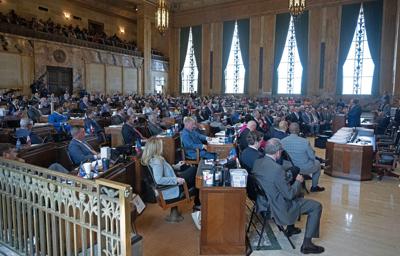The Louisiana Legislature wrapped up its latest lawmaking session Monday after ushering in a few final pieces of legislation.
During the 2024 regular session, Louisiana lawmakers approved the state budget, made changes to the state education system, allowed big changes to the state's floundering insurance system and passed a controversial immigration law.
In all, lawmakers passed hundreds of bills, more than 400 of which have already been signed into law.
The new laws will go into effect on Aug. 1, unless they were passed with an otherwise prescribed date.
Here's a look at some of the biggest bills that were approved and sent to Gov. Jeff Landry's desk.
Education bills
- Education savings accounts: Senate Bill 313 establishes “education savings accounts,” or ESAs, that give parents state tax dollars to pay for private school tuition, uniforms, tutoring and other approved expenses. The overall cost of the program is still unknown, and state education officials will have to decide how much tuition money to give parents and when, if ever, it will offer grants to all families regardless of financial need.
- Ten Commandments in classrooms: Louisiana will soon require that public universities and K-12 schools display the Ten Commandments in every classroom after passing House Bill 71. The bill makes it the first state in the U.S. to pass such a requirement.
Bills targeting LGBTQ+ community
- Bathrooms: HB 608 bans transgender people from using school restrooms, locker rooms or changing rooms that align with their gender identity. The bill also extends to prison and domestic violence shelter bathrooms and sleeping quarters. All-gender, single-occupancy restrooms or changing spaces would still be allowed under the proposal.
- Discussing sexuality: Under HB 122, all talk of sexuality and gender in classrooms, extracurricular clubs and social activities in schools is banned.
- Pronouns: HB 121 requires parental permission for students to change the name or pronouns they use in school. The bill also says school employees cannot be punished for refusing to call a student or colleague by a name or pronoun other than what is on their birth certificate and bans policies that require school employees or students to share their preferred pronouns.
Insurance
- Fortified roof program: HB 120 extends Louisiana's fortified roof grant program, which gives qualifying homeowners $10,000 for a new “fortified” roof. The program was set to expire next year.
- Three-year rule: Under HB 611, Louisiana will phase out its unique “three-year rule,” which barred insurers from dropping policyholders or raising their deductibles if they had been a customer for three years. Companies will now be able to drop 5% of their longtime customers per year. The three-year rule is no longer in effect for customers who get on a policy after August of this year.
- Fair claims processing: Homeowners insurers will now be allowed more time to pay on claims and will be given a “cure period” to resolve issues with homeowners under SB 323.
- Insurance rates: SB 295 allows insurers to increase rates without prior approval from the Insurance Department.
Hemp regulations
- New rules for THC: HB 952 adds new regulations to the hemp-THC industry, including restricting products to those 21 and over, limiting portions for hemp-derived THC products and banning gas stations from selling the products and limits bars and restaurants selling THC-infused beverages.
Abortion
- Abortion pills: Louisiana is poised to become the first state to classify two abortion-inducing medications, misoprostol and mifepristone, as dangerous controlled substances. Under SB 276, those in possession of the medications without a valid prescription could spend up to 10 years in prison, though pregnant women would be exempt from persecution.
Public records
- Local government records: HB 461 allows local governments to withhold records related to certain economic development projects. The bill only applies to projects that involve at least $5 million in capital improvements, or that create permanent jobs in certain areas.
- Public records requests: HB 767 requires that only Louisiana residents be able to request public records from the governor's office. It also allows any records of a statewide official's schedule to be withheld for up to seven days following a scheduled event.
Immigration
- Sanctuary cities: SB 208 prohibits municipalities from crafting policies that impede the federal government's enforcement of immigration laws, often referred to as "sanctuary city laws."
- State immigration laws: SB 388 allows local police to detain people suspected of entering the United States illegally. Under the bill, people living in Louisiana without legal immigration status face up to a year in prison and a $4,000 fine, and up to two years in prison and a $10,000 fine for a second offense. The legislation mimics a Texas law at the heart of a federal court battle.
Energy
- Renewable energy revenue: HB 300 would create a constitutional amendment saying the revenue earned from alternative energy projects, such as wind power, located in federal waters off Louisiana go to coastal protection and restoration projects. This amendment must be approved by voters during the November election. Another bill, HB 305, dedicates money from alternative energy in state waters to the coastal fund.
Others of note
- Surgical castration: SB 371 allows a judge to sentence sex offenders whose victims were under 13 to be surgically castrated. The bill does not apply to offenders under 17.
- Panhandling: HB 97 bans panhandling on public streets and some sidewalks. Panhandling on state highways already is illegal.
- OMV debts: Under HB 683, the state Office of Motor Vehicles would change the way it processes debts, ultimately reducing unpaid debts for many Louisianans who have seen their costs balloon under the current system.
- Lunch breaks for teens: HB 156 eliminates state requirements that 16- and 17-year-old workers receive a 20-minute lunch break when they work five or more hours at a time.

